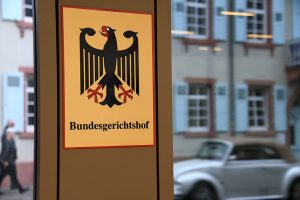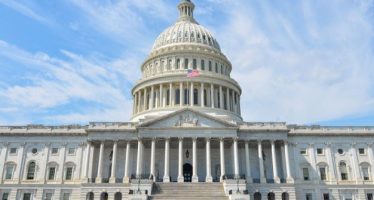A Troubling Edict from Karlsruhe

Sign at the entrance to The Federal Court of Justice in Karlsruhe, Germany.
The European Union is facing the sharpest contraction of economic output since its founding in 1957. This year, the EU’s GDP is set to shrink by 7.4 percent. The steepest declines occur along the northern rim of the Mediterranean in Greece (-9.7%), Italy (-9.5%), and Spain (-9.4%).
Now outside the union, the UK is facing the deepest recession of all European countries with its GDP forecast to lose over 14 percent, according to the Bank of England. This shockingly large pullback compounds the economic adversity caused by the country’s departure from the EU and the increased likelihood that it will lose unfettered access to the union’s internal market as of next year. Negotiations on a comprehensive free trade deal are bogged down over a series of technical issues and may not be concluded in time to prevent a ‘crash out’ scenario.
In Brussels, the corona pandemic has pushed the UK’s plight down the list of priorities. Chief EU negotiator Michel Barnier has received instructions to not indulge the opposing team. He is specifically not to entertain any notions of British exceptionalism and has been told to limit his offer to a barebones off-the-shelf trade deal on a take-it-or-leave-it basis. Given the severity of the Corona Recession, EU diplomats indicated that patience is wearing thin as other more pressing issues need their attention.
Earlier this week, the German Constitutional Court (Bundesverfassungsgericht) in Karlsruhe ruled that the European Central Bank (ECB) failed to observe the principle of proportionality in its Public Sector Purchase Programme (PSPP), aka quantitative easing, that propped up the sagging Eurozone economy between 2015 and 2018 and was restarted last year.
Though the court was at pains to explain that its ruling does not apply to the ECB’s current pandemic-inspired asset buying efforts (PEPP – Pandemic Emergency Purchase Programme), the ruling surprised the market as the judges clearly indicated their unease with the central bank’s largesse. So far, investors are in a holding pattern not quite sure what to make of the judges’ intervention.
The court asked the Bundesbank to stop buying government bonds under the ECB programme in three months’ time unless the European Central Bank can show that these purchases are necessary and serve a well-defined purpose. Analysts fear that the judges may next turn their attention to Germany’s role in the much larger PEPP, potentially derailing the ECB’s entire support effort and preventing the bank from underwriting the post-corona economic recovery project currently being hammered out.
The ECB must explain its actions to the German parliament within three months and seek its approval. If the bank fails to obtain a green light, the Bundesbank must immediately end its participation in the PSPP and clean up its balance sheet, i.e. sell all bonds that were acquired under the ECB programme.
The case on which the court ruled was brought five years ago by a group of about 1,750 German academics and politicians who questioned the legal status of the ECB and pointed out that the bank is not subject to democratic oversight. The plaintiffs also argued that it is not the job of the central bank to ensure the survival of the euro but merely to keep the currency stable and ward off inflation. Market watchers do not doubt the willingness of Bundesbank President Jens Weidmann to implement to court’s instructions to the letter.
The full extent of the ruling, and its many implications, have not yet been absorbed as legal experts dissect the edict from Karlsruhe. Some consider the German ruling a slap in the face of the Europe Court of Justice (ECJ) which has repeatedly confirmed the ECB’s independence.
In its initial reaction, the ECB seems unimpressed and indicated it plans to stick with previous ECJ rulings. Not unreasonably, it considers the Luxemburg-based court to be of a higher legal standing than the German Constitutional Court. The ECB is not expected to give explanations to parliamentarians in Berlin or elsewhere since the bank greatly values its political independence and will not want to set a precedent. ECB President Christine Lagarde may, perhaps, consider an informal chat with members of parliament in order to help diffuse the awkward situation.
However, legal experts also note that the German court does have jurisdiction over the Bundesbank and can force that central bank to end its participation in ECB asset purchase programmes. Without the full backing of the Bundesbank, by far its most important member, the European Central Bank would be reduced to a footnote.
Guy Verhofstadt, leader of the Alliance of Liberals and Democrats (ALDE) in the European Parliament, yesterday said that the German court is acting rather irresponsibly and undermining the functioning of the union: “When national judges of the 27 member states are allowed to question any and all EU decisions, the union will cease to function and exist.”
Though the concerns of the German judges can easily be understood by taking into account their country’s phobia of debts and deficits, the ruling may inadvertently hasten the creation of the transfer union dreaded by the EU’s more prosperous northern member states. There are but two ways to finance the rebuilding of economies ravaged by the corona pandemic: one is to create money out of nothing and the other entails turning up the fiscal pressure in the north to free up cash for the less well-off south.
The first option is the easiest and politically more acceptable of the two. The ECB just monetises the problem and may, as an added benefit, spur consumer spending by introducing a modicum of inflation. Since it is largely a technical exercise, the injection of vast amounts of cash into the depressed European economy via asset purchases is a relatively painless way of providing financial help without directly burdening already disgruntled northern taxpayers.
The fiscal solution apparently preferred by the constitutional court in Karlsruhe is, however, a hot potato – and that may count as an understatement of British proportions. As the acerbic discussion over eurobonds has amply demonstrated, any talk of fiscal transfers from north to south instantly gets the Frugal Four (Austria, Denmark, Sweden, and The Netherlands) and their hangers-on (Germany, the Baltics) up in arms. Dutch Prime Minister Mark Rutte realises all too well that merely broaching this topic equates to political suicide and would invite a massive sweep by nationalist parties in next year’s elections.
Though perhaps well intended and of course legally unimpeachable, the ruling of the German Constitutional Court is also unhelpful. As the economies of Europe plunge to almost unfathomable depths, this is perhaps not the most appropriate time to engage in legalistic nit-picking. Working for decades on end, with varying results, towards the convergence of disparate European nations, the EU must act fast and decisively to prevent the corona pandemic from driving an even deeper wedge in the north-south divide that plagues the continent.
Given that fiscal transfers will only widen that split to a point at which the union falls apart into bickering blocs, the solution to the conundrum lies with the ECB and its ability to create the cheap credit needed for the recovery. The central bank may even be lightly prodded to boost the ‘narrow’ M1 money supply with freshly minted euros, as opposed to just adding bonds to its balance sheet, in order to stimulate growth – and inflation. Monetising may not look pretty but is a lot more palatable to northern politicians than the alternative which may be construed as having, say, a German worker pay for an Italian’s pension.
You may have an interest in also reading…
The Primacy of Politics Returns
A celebrated political economist who received fifteen years of fame for identifying the housing bubble and predicting banking crisis of
Business in Times of Corona: A Gathering Storm Darkens the Prospects of Africa
Even before the corona virus made its presence known, market analysts had no need for prescient powers to predict trouble
When It Pours, Rainy Day Funds Help – A Little
Both the United States and the United Kingdom have joined the increasingly crowded ranks of countries sustaining a debt load


















































































